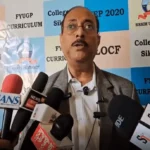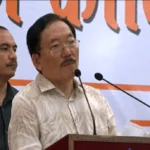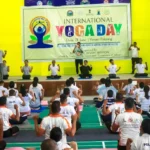Gangtok, June 22, 2025: Former Sikkim Chief Minister and Sikkim Democratic Front (SDF) chief Pawan Kumar Chamling launched a blistering attack on the state’s ruling government during the 33rd Kranti Diwas rally, alleging that 70% of Sikkim’s budget has been swallowed by corruption. His explosive claims have ignited public outrage, with demands for transparency and swift action on irregularities in welfare projects.
A Rally That Shook Sikkim
Thousands gathered in Gangtok for Kranti Diwas, a day commemorating Sikkim’s historic revolution. But Chamling’s speech turned the event into a political earthquake. “Who is the real threat to our Sikkim? It is this very greed,” he declared, accusing the current government of turning governance into a “business venture” that only benefits the wealthy while ordinary citizens suffer.
Chamling, who ruled Sikkim for 25 years, painted a grim picture: criminal elements infiltrating politics, officials involved in drug trafficking, and rising crime rates, including murders and suicides, that the government allegedly ignores. “When government men are drug dealers, how can the government fight drugs?” he asked, drawing loud cheers from the crowd.
The 70% Corruption Claim: Fact or Hyperbole?
Chamling’s most shocking allegation was that 70% of Sikkim’s budget has been lost to corruption, leaving “no white money left—only black money.” While he did not provide detailed financial records, his claim aligns with past controversies:
-
₹1,900 crore missing funds: The SDF previously accused the state of misallocating funds, citing a Comptroller and Auditor General (CAG) report that flagged irregularities in welfare schemes.
-
Electricity tariff hikes: Under the current government, bills have skyrocketed from ₹1,000 to ₹10,000 for some households, raising suspicions of financial mismanagement.
-
Rural neglect: Chamling claimed that rural development funds, which once received 70% of allocations, have been slashed to minimal levels under the current administration.
The ruling Sikkim Krantikari Morcha (SKM) has yet to issue a formal response, but opposition parties, such as the BJP and the Citizen Action Party (CAP), have backed calls for an audit.
Drugs, Crime, and a “Criminalized” Political System
Chamling’s speech zeroed in on Sikkim’s drug crisis, alleging that high-ranking officials are directly involved in narcotics trafficking. “This is a direct attack on Sikkimese society,” he warned. His claims gain traction amid reports of rising drug abuse, particularly among youth.
He also accused the government of being silent on violent crimes, including murders and suicides. “Politics has been criminalized,” he said, suggesting that criminals now control key political structures. This aligns with recent public protests demanding more vigorous law enforcement.
Constitutional Threats and Eroding Rights
Beyond corruption, Chamling warned that Sikkim’s special protections under Article 371F—a constitutional safeguard from its 1975 merger with India are being eroded. “Our rights are being crushed. Peace is being snatched away,” he said, echoing concerns from activists who fear Sikkim’s unique identity is under threat.
Bharat Basnet, a former MP candidate, recently reinforced this sentiment, urging unity to protect Sikkim’s autonomy amid debates over a controversial Sikkim-Darjeeling merger proposal, a move he called legally baseless.
Public Reaction: Anger and Calls for Action
The rally’s crowd erupted in applause at Chamling’s fiery rhetoric, with many demanding immediate investigations into corruption and drug trafficking. Social media has since amplified the outcry, with hashtags like #SikkimCorruption trending.
Meanwhile, SKM’s silence has only fueled speculation. The party, which holds all 32 Assembly seats, faces mounting pressure as opposition groups, including the BJP, vow to probe alleged scams if they gain power.
Chamling’s Vision: A “Green and Happy” Sikkim
Despite his scathing critique, Chamling offered a roadmap for recovery:
-
Knowledge-based economy: Shift focus to wellness tourism and green energy.
-
Joint ministerial audit: A cross-party committee to investigate budget misuse.
-
Restoring Article 371F: Strengthening Sikkim’s constitutional safeguards.
His call to “rebuild Sikkim with love” resonated with supporters, but skeptics question whether his legacy, including past corruption allegations, undermines his credibility.
What’s Next for Sikkim?
With SKM dominating politics and Chamling’s rally reigniting public anger, Sikkim stands at a crossroads. Will the government break its silence and address the allegations? Or will public protests force accountability?
One thing is clear: Sikkim’s people are watching and demanding answers.











2pv9rh